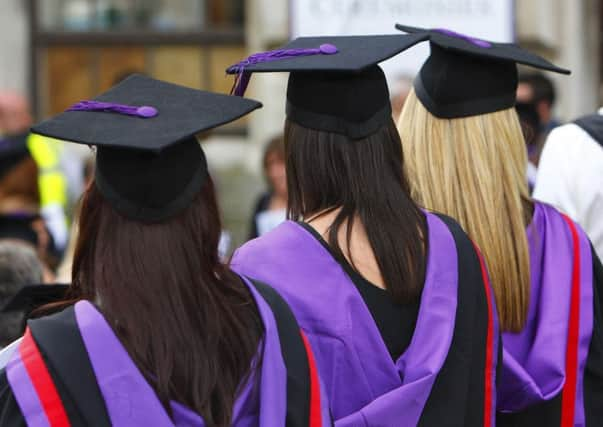University offers show ethnic bias


It also suggests that women and teenagers from richer backgrounds are more likely to get an offer of a degree place.
The new study, by academics at the London School of Economics and Political Science (LSE), analysed 2008 university applications from 50,000 individuals, all of whom were under 21 and had a minimum of two A-levels or equivalent qualifications.
Advertisement
Hide AdAdvertisement
Hide AdThe findings show that applicants from most black and ethnic minority backgrounds were less likely to receive offers from universities than their white British peers.
In total, degree applications from 12 minority groups examined were “significantly” less likely to result in an offer than those made by white British students, researchers found.
The only exceptions were Chinese, mixed white and Asian university candidates, who did not have a significantly lower chance of getting an offer, the study said.
Even after academic achievement, family social background and the type of school a student attended were taken into account, most minority groups were still much less likely to win a university place, it adds.
Advertisement
Hide AdAdvertisement
Hide AdThe researchers calculated that on average, Pakistani candidates received seven fewer offers for every 100 applications compared with white British applicants, whilst Bangladeshi and black African students received five fewer offers and black Caribbean youngsters received three fewer. The study also shows that around 71 per cent of applications from white British students to the most elite institutions – those with the highest entry requirements – resulted in an offer, more than for any other group.
At the other end of the scale, around 49 per cent of applications to these universities from Bangladeshi students resulted in offers, along with 52 per cent of those from Pakistanis.
Academics also looked at the types of universities different ethnic groups were likely to apply to and found that once qualifications, socio-economic status and schooling were taken into account, there was “very little” evidence that candidates from black and minority ethnic groups were reluctant or unwilling to apply to high-status institutions.
The study goes on to say that applications from poorer students, men and young people who had attended comprehensive schools were less likely to result in offers.
Advertisement
Hide AdAdvertisement
Hide AdIt concludes: “The probability of receiving an offer was also significantly linked to the type of school candidates attended and their A-level subjects. Having attended an independent or grammar school, rather than a non-selective school, increased the chances of receiving an offer.”
Dr Michael Shiner, an associate professor at the LSE’s department of social policy, said: “We know that students from black and minority ethnic groups go to university in good numbers, but our analysis raises concerns about the fairness of the admissions process.
“Even when we take account of A-level grades, candidates’ chances of receiving an offer vary according to their ethnicity, the type of school they attend and their family background. For some candidates these factors combine to create quite marked differences. Although the vast majority of applicants do eventually get a place at university, non-academic factors influence the offers they receive and the choices that are available to them.”